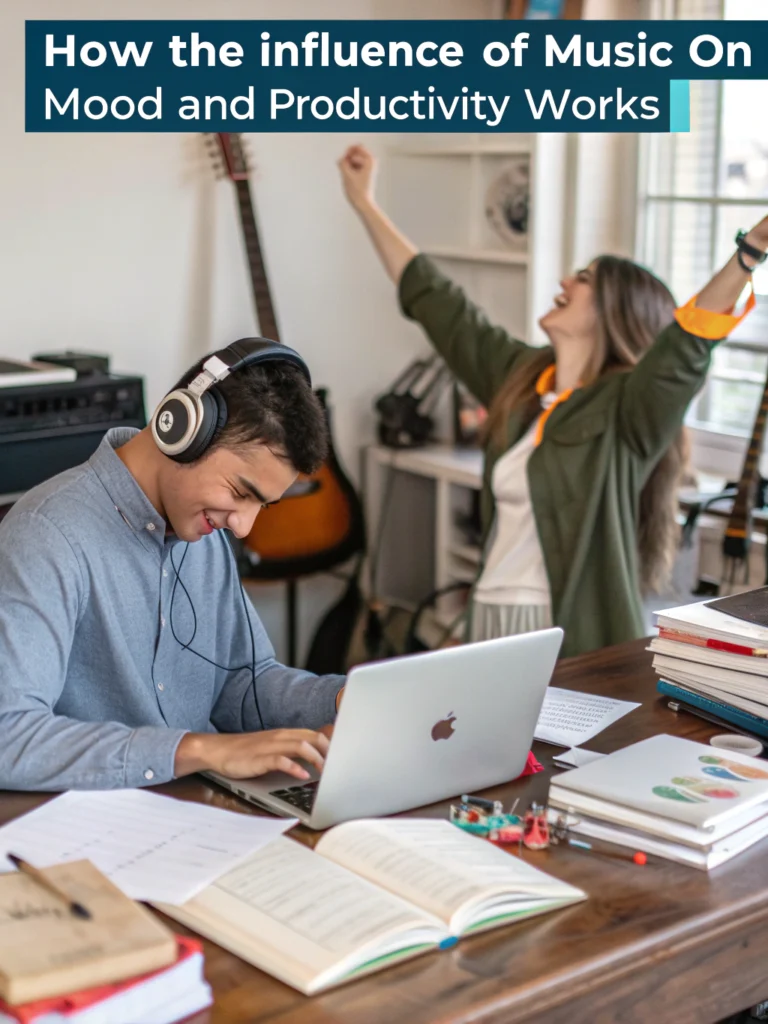How the Influence of Music on Mood and Productivity Works
Ever wondered why certain songs make you feel motivated while others help you relax? The influence of music on emotions is more powerful than most people realize. I've discovered firsthand that the right soundtrack can transform my workday from sluggish to supercharged.
When exploring the influence of music on mood and productivity, science backs up what many of us intuitively know: music affects our brain chemistry, emotional state, and ability to focus in profound ways.
The Science Behind Music and Your Brain
Your brain responds to music in fascinating ways. When you listen to music you enjoy, your brain releases dopamine—the same chemical associated with pleasure from food or success. This neurological reaction explains why music and productivity often go hand-in-hand.
Different types of music activate various parts of the brain:
- Classical music stimulates areas involved in spatial reasoning
- Upbeat music with positive lyrics boosts mood and energy
- Familiar music activates memory centers
- Ambient music can reduce stress hormones like cortisol
These neural responses have real-world implications for how music can transform your work environment.
How Different Music Genres Affect Your Work Performance
Not all music works the same way when it comes to productivity. The impact of music on mood varies significantly depending on the genre and your specific task:
For complex tasks requiring deep thinking:
- Instrumental music without lyrics
- Ambient or classical compositions
- Nature sounds or white noise
For repetitive or physical tasks:
- Upbeat, familiar music
- Songs with motivating lyrics
- Higher tempo tracks (120-140 BPM)
Personal preference matters tremendously. What energizes one person might distract another, making the relationship between music and productivity highly individualized.

Finding Your Focus: When Music Helps vs. Hinders
Understanding how music affects focus requires recognizing your work style and the nature of your tasks. I've found that music can be either your greatest ally or worst enemy depending on:
- Your personality type (introverts vs. extroverts respond differently)
- The complexity of your current task
- Your familiarity with the music
- The environment you're working in
For instance, when I'm writing complex content, lyrics often compete with my own words. But when organizing spreadsheets or handling repetitive tasks, upbeat music with lyrics actually improves my speed and accuracy.
Need help maximizing your productivity beyond music? Check out the
>AI for Productivity eBook + Checklist: Supercharge Your Efficiency in 2137, which offers cutting-edge techniques to complement your music-enhanced workflow.
Creating the Perfect Productivity Playlist
Want to start using music to boost productivity? Here's my approach to creating the ideal soundtrack for different work scenarios:
For Deep Focus Sessions:
- Instrumental compositions (classical, lo-fi, ambient)
- Consistent tempo without dramatic shifts
- Moderate volume that blends into background
- Extended pieces that don't require frequent changes
For Creative Work:
- Music that evokes the emotional tone of your project
- Varied selections that inspire without distracting
- New discoveries that stimulate novel thinking
For Energy Boosts:
- Nostalgic favorites that trigger positive memories
- High-energy tracks with motivating lyrics
- Songs that match your desired energy level
The key to music for better concentration is consistency without monotony—finding that perfect balance where the music supports your work without stealing your attention.
If you struggle with focus and organization, especially with ADHD, the
>ADHD Productivity Power Pack: Ebooks, Guides, Checklists, Workbook & Tools to Master Focus, Time Management & Organization provides specialized strategies that work alongside your music techniques.
The Workplace Music Revolution
The benefits of music at work have become increasingly recognized in modern office cultures. According to research from Cornell University, appropriate background music can increase productivity by up to 20% for certain tasks.
Many progressive companies now:
- Provide noise-cancelling headphones
- Create dedicated quiet zones with ambient music
- Design acoustic environments that balance collaboration and focus
- Use music to signal different modes of work (focus time vs. collaborative sessions)
However, workplace music policies should remain flexible, recognizing that individual preferences vary dramatically.
Balancing Music with Other Productivity Techniques
While music can significantly boost your output, it works best as part of a comprehensive productivity strategy. Consider combining music with:
- The Pomodoro Technique (25-minute work sprints with 5-minute breaks)
- Strategic desktop background organization that complements your music mood
- Energy management techniques that align with your natural rhythms
- Productivity planners that schedule focused music sessions
Remember that finding the right balance may require experimentation. What works during morning hours might differ from afternoon preferences.
Leveraging Music for Emotional Regulation
Perhaps the most powerful aspect of music is its ability to regulate emotions. The influence of music on emotions extends beyond just feeling good—it can fundamentally shift your mental state when you're stuck.
When you're:
- Feeling anxious: Slow tempo music (60-80 BPM) can reduce heart rate
- Lacking motivation: High-energy tracks with inspiring lyrics boost drive
- Overwhelmed: Nature sounds or ambient compositions reduce stress hormones
- Bored with routine tasks: Familiar favorites make repetitive work enjoyable
This emotional regulation extends beyond the workplace, creating a healthier overall relationship with productivity and work-life balance.
For additional focus strategies, check out the best apps designed specifically for ADHD productivity that can complement your music approach.
Conclusion
The influence of music on mood and productivity isn't just anecdotal—it's backed by neuroscience and increasingly recognized in professional environments. Music functions as a powerful tool for emotional regulation, focus enhancement, and energy management when used strategically.
The key lies in personal experimentation, recognizing that your optimal productivity soundtrack may differ from others and even vary based on your specific tasks, energy levels, and goals. By thoughtfully incorporating music into your work routine, you can create an environment that maximizes both creativity and output.
So next time you sit down to work, consider not just what you'll do, but what you'll listen to while doing it—the right soundtrack might be the missing piece in your productivity puzzle.
FAQs About Music and Productivity
Is it better to work in silence or with music?
It depends on your personal preference and the nature of your task. Complex verbal tasks often benefit from silence or non-lyrical music, while repetitive or routine tasks can be enhanced with more engaging music. Experiment to find what works best for specific scenarios.
What type of music is best for concentration?
Most research suggests instrumental music at a moderate tempo (around 60-70 BPM) without lyrics works best for concentration. Classical music, ambient sounds, lo-fi beats, and film scores are particularly effective for many people.
Can music actually make you more productive?
Yes, studies show music can increase productivity by up to 20% for certain tasks by improving mood, reducing stress, masking distracting noise, and providing rhythmic stimulation. However, results vary by individual and task type.
Should I listen to familiar or new music while working?
Familiar music typically requires less cognitive processing, making it better for focus. New music can stimulate creativity but may be more distracting. For routine tasks, familiar music often works best; for creative challenges, new discoveries might inspire fresh thinking.
How loud should my music be for optimal productivity?
Moderate volume is typically best—loud enough to mask minor distractions but not so loud it becomes distracting itself. Studies suggest approximately 70 decibels (normal conversation level) works well for most people.
Can music help with work-related stress?
Absolutely. Music stimulates stress-reduction through decreased cortisol levels, lower heart rate, and regulated breathing. Slow tempo music (60-80 BPM) is particularly effective for stress management during high-pressure work.

